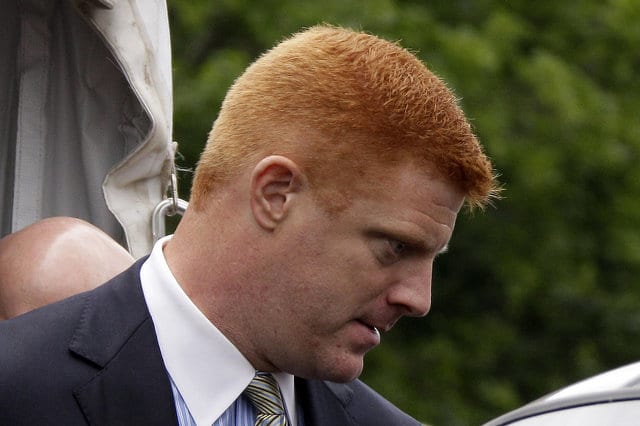Mike McQueary’s whistleblower lawsuit against Penn State will go to trial in October in Centre County Court, a judge ruled on Thursday.
In an opinion made public on Monday, Judge Thomas Gavin denied Penn State’s most recent motion to stay the case pending the outcomes of criminal cases against former administrators Graham Spanier, Tim Curley and Gary Schultz. Jury selection is scheduled for Oct. 10, with the trial to begin on Oct. 17.
McQueary, the former Penn State football assistant who said he told Penn State administrators he witnessed Jerry Sandusky abusing a boy in a locker room shower in 2001, is seeking $4 million in damages on whistleblower, defamation and misrepresentation claims.
McQueary is arguing that Penn State discriminated against him for cooperating with prosecutors in the investigation of former Penn State football assistant coach Sandusky, who was convicted on 45 counts related to child sexual abuse in 2012. The boy McQueary said he saw being abused was named as Victim 2 in Sandusky’s trial. That victim did not testify at Sandusky’s trial, though whether prosecution and defense attorneys knew his identity and what he may have said happened is one of the issues Sandusky has raised in his search for a new trial under the Post Conviction Relief Act.
McQueary also charges that he was defamed by verbal and written statements from university administrators which he says suggested he had lied about what he had seen and told them in grand jury testimony. He says former athletic director Curley and former vice president Schultz misrepresented to him that they would see his reported incident would be investigated.
Since he was not retained as a coach in 2012, after Bill O’Brien was hired as successor to Joe Paterno, he is seeking back and future pay as well as general damages and damages incurred from harm to his ability to earn a living.
Penn State had argued in a motion at the end of May that Schultz and Curley, to whom McQueary reported the incident, were deposed and both asserted their Fifth Amendment privilege as they still await trial on charges of child endangerment and failure to report suspected child abuse. University attorneys said that without ‘the critical knowledge and information that is solely possessed’ by Curley and Schultz, Penn State ‘is severely prejudiced in its ability to defend’ against McQueary’s claims.
But Gavin — who also denied a university motion to stay in 2012, shortly after McQueary filed the suit — ruled there is no practical reason for the suit to be delayed any further.
On the whistleblower count, Gavin wrote that McQueary was required to establish that he had reported wrongdoing to his superiors.
‘Penn State cannot reasonably dispute this given that a criminal jury convicted Mr. Sandusky of the conduct plaintiff said he reported…,’ Gavin wrote, adding that a trial would determine if he was fired for doing so. If he were, the testimony of Curley and Schultz is irrelevant, Gavin stated, because McQueary was placed on administrative leave and his employment later terminated by Penn State after Curley and Schultz had left their positions.
On the defamation count, Gavin ruled that it is a ‘seemingly undisputed fact,’ that then-President Spanier approved a press release which McQueary argues cast doubt on McQueary’s credibility. He noted that Spanier has not invoked his Fifth Amendment rights regarding the press release. Whether the press release rose to the level of defamation would be determined at trial.
Penn State argued that testimony by Curley and Schultz would be vital on whether they misrepresented to McQueary how they would handle his report. Gavin, however, ruled that Penn State has had four years to search its own records to determine if Curley and Schultz had seen ‘the matter was properly investigated and appropriate action taken,’ as McQueary had claimed.
‘While Messrs. Curley and Schultz can possibly deny the statements attributed to them, the objective circumstantial evidence is that no such action was taken by them,’ Gavin added. He said juror questions on the verdict slip would assess the impact of the administrators’ unavailability on the verdict for the misrepresentation count and action would be taken if required.
Gavin also stated that the Penn State administrators’ cases have dragged on for years, with the university footing the bill, while McQueary funds his own litigation. Gavin said he spoke with Judge John Boccabella, who was recently assigned to the administrators’ cases, and that under the best circumstances Curley and Schultz would likely not be available ‘until the middle of 2017.’ Gavin wrote that their cases could conceivably continue to play out for years to come.
McQueary, meanwhile, is ‘suffering ongoing economic harm,’ having expended his available resources to meet his expenses and having been unable to obtain a coaching position at any level.
‘I question whether this is a reflection of his coaching skill or due to the notoriety surrounding him resulting from his involvement in the Sandusky case,’ Gavin wrote. ‘In either event, he has no job… Economic harm is a recognizable form of prejudice.’



